Wednesday 14th December, 2011. Hotel Prigi, Prigi, East Java.
Total distance: 868.6km
Our day off in Manang was a resounding, lazy, success. We saw very little of the city, and a lot of our hotel room where we spent much of the morning eating food and watching a documentary about the moon landings (Bromo's moonscape had obviously gotten under our skin, although there don't seem to be any decent cycling routes we could take). The rest of the day was more of the same – which was a shame because Malang seemed like quite a nice place to explore, but we felt entitled, nay, duty-bound to spend the whole day doing zip. So that's what we did.
 |
| They grow a lot of rice in Indo. |
We had three options from Malang. The first was heading back up to Surabaya and taking the northern highway. We didn't even bother discussing this option, highways being the kind of things we only do when we have to. The second option was directly west, across the centre of Java, which would have taken us through some interesting looking terrain, but it was steep – creeping up to 1500m which we weren't too keen on doing again so soon after Bromo. The final option, and the only choice really, was the south road. We knew nothing about it except that we could dip down off it and follow some side roads along the coast, and that there might be a few hills, but nothing more than 600m. Little did we know what we were getting ourselves in for.
The next morning after an unhurried breakfast the compass came out, swung its needle around for a moment then pointed us south. We went that way down the road, and kept on. It might seem blindingly obvious to some of you, but it has been something of a revelation to me that if you want to get somewhere you don't need a GPS or print outs of step by step instructions. Even in the busiest cities you can just whip out a compass and point yourself in the direction you want to go. If you come to a junction and the road signs aren't any use, check the compass again. If you keep on in the right direction you will come to any main roads heading off that way. It works like a charm, and has made escaping the often tangled mess of inner city roads a doddle.
Once we were clear of Malang it was obvious that we had made a very good decision about coming down this way. The road was flat and the traffic relaxed, and on either side of us flooded rice fields glittered in the midday sun. Next thing we knew the road plunged down into tropical rainforest, and snaked its way down valleys dripping with vegetation, at angles perfect for coasting around on a bicycle. It was one of those roads that somehow seemed to have more down than up, and we cheered as we wound our way down, occasionally joined by the chuff chuff chuffing of the freight train that ran along the track nearby.
We were at the bottom of one of these windy-roaded valleys, having just crossed a low bridge and under a large archway that marked the entrance to a small village, when the rain began to fall. Who'd have thought it? In a rainforest as well! We took shelter to throw on a jacket, but set off again right away, confident that it would ease off soon enough. What began as a small shower though, built up quickly into full blown monsoon rain and we found ourselves cycling slowly uphill with no villages or houses in sight. We gritted our teeth and got on with it, and finally we came to a small warung at the top of the hill. We darted in, dripping wet as the rain somehow managed to get even heavier outside. We hadn't even known it was possible for it to rain so much. It was biblical. We spent an hour or so sat around on an old wooden bench drinking ginger coffee and eating fatty Indonesian crisps. The owners smiled at us, and we smiled back and said a few jerky and often uncomprehended sentences. Although staring out of the window and pulling startled faces at the rain filled in for our inability to make conversation.
The rain finally eased off to a light shower, and we jumped back on our bikes and continued on our way. We were hoping to get to the city of Blitar, some 100km away from Malang, but it was well into late afternoon when we set off again, and we still had 50km or more to go. We were in good spirits though, and not too concerned about missing the mark as we were sure that something would come up. In the mean time we were treated to a spectacular show of lights, as lightning cracked across the sky in bursts every few minutes or so, casting jagged white branches of light across the whole sky in front of us.
Our method does get results though, and after a bit of winding down dark country roads we came across some motel style accommodation and turned in for the night.
Saturday 17th December, 2011. 5:45am. The residence of Mahmoodi and Suprehati, Munjungan, East Java.
Total distance: 901.1km
Rain and lie ins had conspired to make our first day out of Malang a fairy short one; we only managed 60km, so the next day we got ourselves up just as the sun was rising at 5am, and packed and left before 7am. We made excellent time, taking breakfast in Blitar and winding up in Tunnunngunung for lunch at 11am. It was only 11am and we had already nearly matched the distance we'd done the day before. Beautiful. Unfortunately in our rush to get away that morning I had taken the key to our room with us, so when we got to Tunnunngunung we had to use our one-step navigation system to locate the post office, and mail it back. This wasn't easy since I didn't remember the name of the motel, and nobody there spoke English, and I didn't speak anywhere near enough Indonesian. But a few phone calls by the friendly staff got it all sorted. We still had plenty of time left in the day though, even after spending a few hours cruising around the town, and we set off directly south again, away from the main road and down into a tangle of minor roads that ran down to the coast.
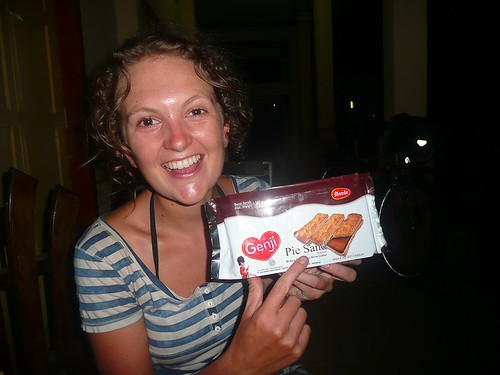 |
| "Pie sand" is actually pretty nice... |
As we stopped off at a shop to cool down with a drink we were lucky enough to meet a local man who spoke very good English, and after a few pleasantries about each other we grilled him on the coastal towns we were heading for. There didn't seem to be much, but he was fairly confident that Prigi, one of the first settlements we'd reach that was by the sea, had a couple of places to stay.
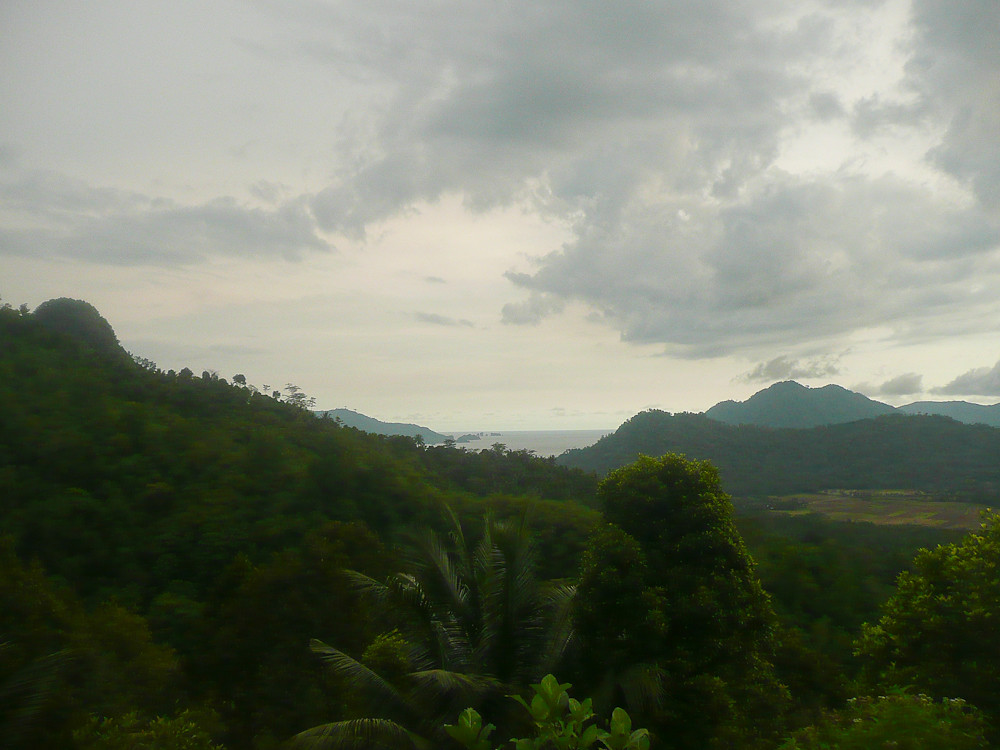 |
| Our first view down towards Prigi. Note the hills, they will be important later on. |
Prigi was a large town that ran along the road for a few kilometres at the base of the hills and up to the coast. We thought at first that local tourism must be a driving economic force here, not only because the beaches looked spectacular, but because the majority of shops were either hair salons or fashionable clothes stores. Once we got down to the coast though we discovered that there was only one hotel in town, and it was dead. Packs of fishing boats bobbed tightly together at the harbour, and out in the bay more were at work. Seeing this, combined with the reams of fishing nets laid out on the beach, and the statue of a man at the roundabout holding a large fish, led us to the conclusion that fishing might just be the mainstay here. What all the salons and clothes shops were doing we're not sure. Perhaps the fishermen just like to look good when they cast a net.
We took two nights in the hotel near the roundabout, and enjoyed a lazy evening's supper of freshly caught fish, followed by a day off in which we cycled back up the road to the local fruit market, found an internet cafe to update this blog, and sat outside our hotel room reading while afternoon rain poured down around us. It was relaxed, and very enjoyable.
 |
| The beaches in Prigi were bloody spectacular. |
Sunday 18th December, 2011. 5.40am. The residence of Tomy and Siti, near Panguul, East Java.
Total distance 931.3km
Prigi had brought us down off the yellow secondary road marked on our map, and into the far eastern edge of a web of minor roads and tracks that ran along the coast. The roads weaved their way along the coast line for some 100km before rejoining a major route at a place called Pacitan. With a bit of estimating, plus a cheeky glimpse on google maps, we discovered that Pacitan was a little over 100km away – a long way, but not impossible to make in a single push if we were up early and worked hard at it the next day... or so we thought.
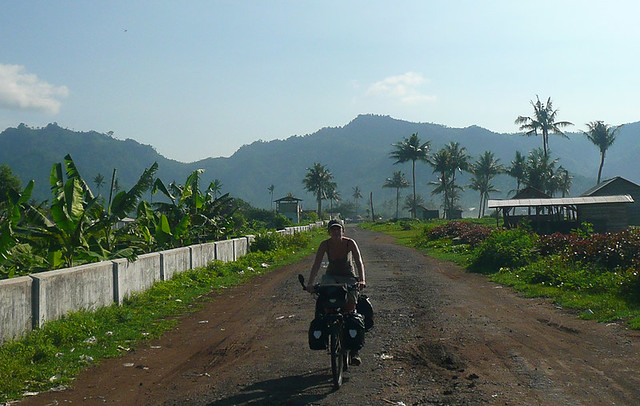
We woke ourselves at 6am and got ourselves washed and ready as quickly as possible, pouring buckets of water over ourselves in the bathroom, Indonesian style. We packed whatever had been unpacked the day before, and just after 7am we were wheeling our bikes out of the room, and standing by the side of the road looking at our map. There was a village less than 5km away, in fact there were villages dotted every 5km or so the whole way to Pacitan, so we figured we would get to the next village that had a warung, eat some breakfast, top up our dromedary bags with water, and then continue on to our destination, safe in the knowledge we'd already knocked off 10km or more before we'd even started.
 The map suggested that the road we needed to take ran very close to Prigi beach, and so we rode down to the fish-wielding statue at the roundabout and turned east along the coast road, which ended abruptly in a deserted hut and wasteland after 200m. We turned back and then, across a patch of grassy land, we saw a truck heading in the direction we needed to go, so we cut across the grass, and joined this much larger, tarmacked route.
The map suggested that the road we needed to take ran very close to Prigi beach, and so we rode down to the fish-wielding statue at the roundabout and turned east along the coast road, which ended abruptly in a deserted hut and wasteland after 200m. We turned back and then, across a patch of grassy land, we saw a truck heading in the direction we needed to go, so we cut across the grass, and joined this much larger, tarmacked route.The morning was a spectacularly deep lapis lazuli blue, and all around us hung fronds of shining palm leaves. We could have been riding through any number of holiday brochures, especially whenever we rode past the beaches; long sandy and completely deserted. The only footsteps on them made by little crabs that scurried along on tip toes before darting into one of their burrows.
Unfortunately for us however, time and again, the road shrank away, or ended abruptly at a tributary feeding into the sea. We stopped, took in the paradise views, then turned around and cycled back along the sandy track that we had just come down. We still hadn't found the road, and were too caught up with trying to find our way to remember to stop for breakfast. We'd do that once we were on the right track.
The land away from the coast was steep, and the third time we were forced to turn back we had to cycle back up a stern-angled road that demanded that we stand to force our full body weight down on the pedals to get them to turn. It was steep, and the day was quickly heating up under the Pacific sky.
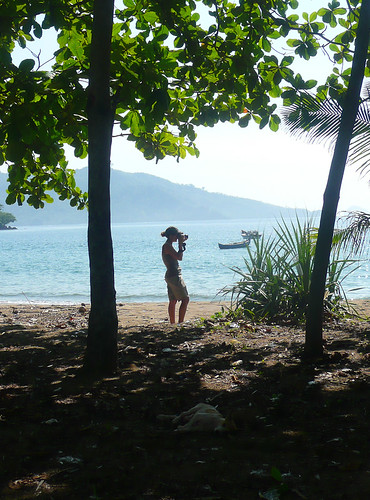 Where were we to go now? Did we need to cycle all the way back to Prigi and go back out the way we had come two days before? As we came to the brow of the unforgiving hill we noticed a small trail leading off away from the coast. We waited, and then asked a motorcyclist who came buzzing down whether this road led to Pacitan. He said a lot of things to us, none of which we understood, but eventually we did discover that it did indeed lead to our destination, although qualifying statements kept being added to any confirmation of this. Happy that at last we had found a road that went where we were going, we set off up the steep stony trail with the heat of the sun on our backs. Our optimism was not to last.
Where were we to go now? Did we need to cycle all the way back to Prigi and go back out the way we had come two days before? As we came to the brow of the unforgiving hill we noticed a small trail leading off away from the coast. We waited, and then asked a motorcyclist who came buzzing down whether this road led to Pacitan. He said a lot of things to us, none of which we understood, but eventually we did discover that it did indeed lead to our destination, although qualifying statements kept being added to any confirmation of this. Happy that at last we had found a road that went where we were going, we set off up the steep stony trail with the heat of the sun on our backs. Our optimism was not to last.The track we had taken was very narrow and steep, and in about as bad a state of degradation as any track can get. It might have been sealed at some stage in its life, but in many places it had worn away back to mud that sent our rear wheels skittering out behind us as we forced the reluctant pedals around. Where remnants of the road had survived the track was a cobbled minefield of loose stone that made riding more than a few metres almost impossible as the large loose rocks that made up the surface shifted under our weight, sending a wheel suddenly off to one side, or jarring under us and killing our momentum. It was swelteringly hot, it was all up hill, and pretty quickly we were forced to get off and push.
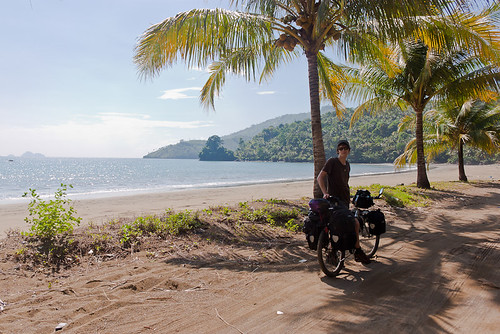 Concentrating so hard on the unforgiving conditions, time leaked out of the morning, and before we knew it it was midday; we still hadn't had breakfast, and we still hadn't topped up our dromedary bags. And although we'd been on this track since 9am, my cycle computer suggested we'd barely made 2km. “I don't think we'll get to Pacitan today.” I said to Liv, breaking the silence after I had dropped my bike and thrown myself into the shade of a tree, exhausted after yet another sharp incline.
Concentrating so hard on the unforgiving conditions, time leaked out of the morning, and before we knew it it was midday; we still hadn't had breakfast, and we still hadn't topped up our dromedary bags. And although we'd been on this track since 9am, my cycle computer suggested we'd barely made 2km. “I don't think we'll get to Pacitan today.” I said to Liv, breaking the silence after I had dropped my bike and thrown myself into the shade of a tree, exhausted after yet another sharp incline.Heavy rain clouds were moving in from the east, and so we decided that the best course of action was to sit out the midday heat and wait until the rain broke. We could see dark clouds bubbling up above Prigi in the valley below and moving towards us. An afternoon storm would shade us from the sun and the rain would keep us doubly cool. I was convinced that was necessary if we were to have a chance of tackling the trail. We sat and waited for the storm to come, but although a fog of rain covered the hills off in the distance, the clouds obstinately refused to come up the ridge that we were on, and came no closer to us. The sunlight held its clear trajectory, unimpeded by cloud, onto our lonely little track, in the middle of a rainforest in East Java. As we sat there waiting in the shade for a storm that refused to come, we drank the last of our water, and cursed ourselves for not topping up before we left Prigi.
We weren't totally defeated yet though, and we acquired some small refreshment from a coconut dangling from a nearby tree. It took a while to get the thing down – in the end I had to wrap my bicycle cable lock around it and then, holding on to the other end, leap out of the tree so my body weight ripped it from the branch. It worked, although it also brought the coconut down directly on my head. Twice in one lifetime, I swear...
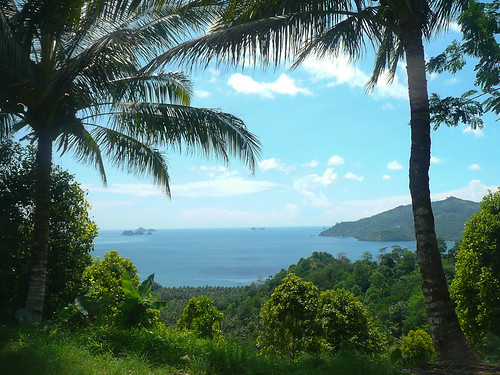 |
| Hard work but beautiful views |
Although the track ascended nearly the whole way occasionally we were treated to a little run of downhill; never too far, never for more than a hundred metres or so, but it allowed us to enjoy the breeze against the coating of sweat we'd produced, and it was a hundred metres gained without busting a gut like the rest of them, although the appalling state of the road made the free rides downhill precarious ones.
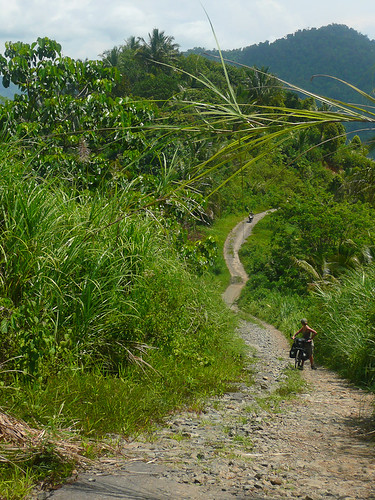 By 3 o'clock we were getting close to the end of our tether. It was like the debilitating heat and humidity of Darwin all over again, but set on slopes to match Bromo, and on the worst road conditions we've ridden so far. For a long time, since before we stopped for our coconut lunch, we had been reduced to pushing the bikes at a slow, grinding pace, feet slipping on rocks, up what seemed like an endless run of uphill. When I left for this trip I had the idea that to push the bike at any point was kind of cheating. I'm cycling across Indonesia, not walking across it. Liv discussed this with me, holding the far more sensible notion that there will be times, Robin, when we have to push. Day number one, leaving Denpassar to Mount Batur and exhausting ourselves on the way, underlined that point very clearly indeed, and our experiences pushing up this hill near Prigi put it in font size 72 with animated stars flashing around its borders. Pushing is necessary at times. It was not possible to cycle up this hill. Even if the road was not a jumble of sliding stones, it just kept on going up and up for miles, and would have been too much for either of us anyway. And believe me, pushing fully laden bikes up this track did not feel like cheating at all. It was utterly exhausting.
By 3 o'clock we were getting close to the end of our tether. It was like the debilitating heat and humidity of Darwin all over again, but set on slopes to match Bromo, and on the worst road conditions we've ridden so far. For a long time, since before we stopped for our coconut lunch, we had been reduced to pushing the bikes at a slow, grinding pace, feet slipping on rocks, up what seemed like an endless run of uphill. When I left for this trip I had the idea that to push the bike at any point was kind of cheating. I'm cycling across Indonesia, not walking across it. Liv discussed this with me, holding the far more sensible notion that there will be times, Robin, when we have to push. Day number one, leaving Denpassar to Mount Batur and exhausting ourselves on the way, underlined that point very clearly indeed, and our experiences pushing up this hill near Prigi put it in font size 72 with animated stars flashing around its borders. Pushing is necessary at times. It was not possible to cycle up this hill. Even if the road was not a jumble of sliding stones, it just kept on going up and up for miles, and would have been too much for either of us anyway. And believe me, pushing fully laden bikes up this track did not feel like cheating at all. It was utterly exhausting.These were steep slopes, and they went on and on. Sweat soaked hair dangling in our eyes, merciless heat on our backs melting what little energy we had left. To get the bikes to move at all we had to push ourselves right up into the handlebars and heave, like shire horses. We'd move a few steps, then the bikes would pitch under a rogue stone and we'd have to quickly right it to stop it from falling over. Stones would slip under our feet as we try to push off again. Finally we'd reach the turning at the top of the hill and... there was another hill. Hot, heavy, grinding, exhausting. It was not pleasant.
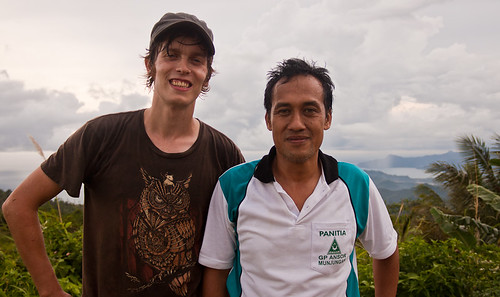 |
| Tired at the top of the hill. Finally. |
Just then a motorbike came down the hill with a fridge strapped to its back, filled with lollipops and ice-cream. Yes, really. We offered to buy a round for all involved in our coconut revival, but they declined, and for a while Liv and I just stood there guzzling down ice pops and coconut milk, feeling our energy returning to us from the belly outward. Mahmoodi asked us about what we were doing on this out of the way road, and we explained as best we could that we were heading for Pacitan, but thought we'd taken a wrong turn somewhere. He asked us where we were staying tonight and we shrugged, gesturing vaguely at our tent and asking if there were any losmen in the next village.
 |
| The view from the top. |
The three of us reached the top as the sun was setting, all of us exhausted and dripping with sweat. But there was no time to rest. Mahmoodi led the way down the other side of the hill, winding down a steep road plagued with deep pot-holes, and then through villages set into flat land up in the hills. The low evening sun swept the rice fields in a golden light, illuminating farmers who still hacked channels through the mud, or tugged at weeds in the water there. I wondered what kind of day they had had.
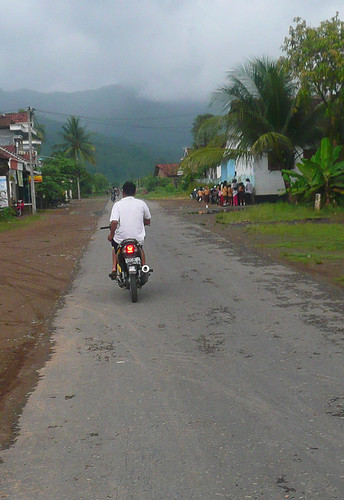 |
| Following Mahmoodi through the tiny streets. |
The house was a real delight. The front door led into a low, wide room with black tiles and a small wooden table in one corner for eating off. Doorless archways led off in different directions, one into the stone kitchen, with shining pots and pans hanging from the walls, and then on into the courtyard; another into the family's bedrooms, and another into the living room. After eating a big plate of fried noodles I was shown into the courtyard, that had at its centre an enormous well, complete with bucket and winch. Two brick structures stood beside it, the shower room and the toilet, capped with red tiles. Kittens prowled around nearby, pouncing on dangling strands of rope while mice scurried along the water ways that drained out towards the street. It was like a small piece of a medieval world transplanted into the present, it was wonderful.
Drying my hair I came back round through the kitchen and into the living room, where Olivia was sat around with Suprehati and the kids. It was a really nice set up, with a polished stone floor, framed pictures on the wall, and a large wooden model of a boat sat on top of the bookshelf.
And yet the true stars of the show were of course Suprehati and Mahmoodi themselves. They made us feel right at home which was impressive since we really struggled to understand each other at times. We were given constant access to these ace little oranges and a massive bowl of peanuts, and we showed them the route we had ridden from Bali to get here, and Mahmoodi explained that he was a fisherman - the model on the bookshelf being a reproduction of his vessel. Based on the size and splendour of the house, it seems that fishermen around these parts do quite well for themselves. Perhaps well enough to support the economy of hair salons we'd seen in Prigi.
Before too long though we were caught by the inevitable fatigue that had been building all day, and we were shown to our own room; complete with double bed, our own fan and a big bottle of water. Utterly exhausted we fell asleep almost immediately.
Tuesday 20th December, 2011. 5:45am. Happy Bay Beach Bungalows, Pacitan, East Java.
Total distance covered: 1007.3km
The next morning after breakfast, Mahmoodi summoned me outside to a small table with our map laid out on it and began gesturing to the road that lay ahead. There was something like 80km to go to get to the next major town, Pacitan, and although we were resigned to the fact that we were unlikely to make it in one day, a optimistic corner of our minds entertained the possibility. Mahmoodi's face was serious though, as he pointed out a 30km stretch of road between Munjungan, the town we were at now, and Panguul. “Same, same.” he said, then pointing back to the road from hell we had battled against the day before.
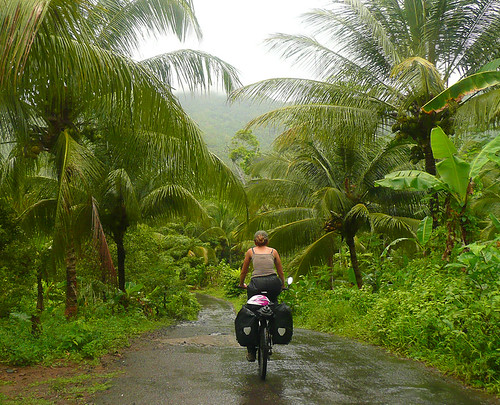
I paused, taking this in, then asked, “Same?”
He nodded, holding up a slanted palm; international symbol for 'steep road'.
The trouble was we didn't have any choice. The only other route we could take would be back the way we had come. There might have been a better road back to Prigi – certainly the one we joined at the top of the hill the day before was in much better condition and headed back that way, but it still would mean a lot of back tracking without the guarantee of finding a better route.
At least Mahmoodi seemed to be quite sure that once we got to Panguul the road was good enough to warrant two thumbs up and a smile. His hand signals suggested it was a little up and down but with some flat and a nice run of downhill. We'd just have to see, although we were both anxious as we loaded our bikes and checked the brake pads, that had been taiking a beating these last weeks.
Mahmoodi rode ahead of us for the first 10km of flat through the winding roads that connected the villages together. At the small junction that led off west and onto our road he bade us farewell, and we thanked him profusely – this man and his family really were extraordinarily kind to us, and we shan't ever forget their kindness. Then it was just the two of us, a little sealed road leading straight into a slight rise, and buckets of trepidation.
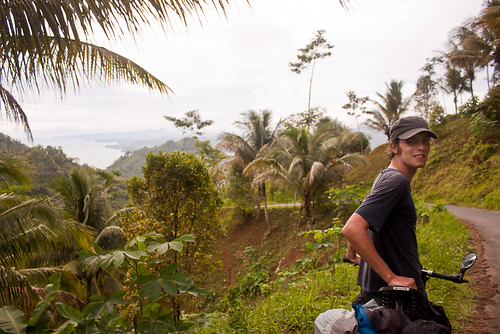 Of course it was nothing like the day before - that had been spectacularly difficult, and this time we had already eaten a huge breakfast, topped up our water bottles and drom bags, plus we'd been given two packs of vegetable crisps to keep us going. No, we were much better prepared and I don't know if it would be possible for a road to be any worse than the day before, short of it having spring loaded traps set along it, and being iced over. The road quality was enormously improved, it was wide, and pot holes were the rare exceptions, rather than the rule. But it was, as we were warned, up hill.
Of course it was nothing like the day before - that had been spectacularly difficult, and this time we had already eaten a huge breakfast, topped up our water bottles and drom bags, plus we'd been given two packs of vegetable crisps to keep us going. No, we were much better prepared and I don't know if it would be possible for a road to be any worse than the day before, short of it having spring loaded traps set along it, and being iced over. The road quality was enormously improved, it was wide, and pot holes were the rare exceptions, rather than the rule. But it was, as we were warned, up hill.So, another full day of gruelling work out. We rode from about 8am until 5pm, with a few short breaks in between. Of course it wasn't uphill the whole way, no, this was much more demoralising terrain that forced you up a steep ridge over the course of an hour, then let you ride down the other side right to the bottom in the space of about 10 minutes, and then begin the tiring task of getting up the next ridge in the line. This pattern went on all day, as we ground our way over the innumerable hills in paradise.
As the day was collecting itself up ready to let the night in we were on the final approach to Panguul. It seemed like the last 3km were, mercifully, going to be flat, and we pedalled through the patchwork of rice paddies with high spirits on tense but weary legs. We were over the worst of it now. Even today, which had seemed at times to be a never ending run of steep uphills, showed signs of easing off with each ridge being lower and slightly gentler than the one before.
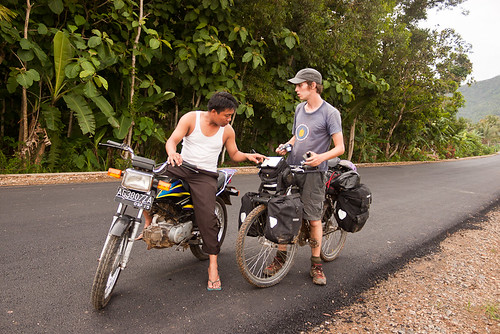 We were slowly cruising along a wide, tarmacked road, keeping an eye out for a losmen that we knew was somewhere in the area, when a local stopped beside us on his motorbike, curious as to what we were up to, and where we had come from. We explained our plan, and he invited us in for a coffee at his house just a few metres up the road. His name was Tomy, but we quickly met his wife Siti, and his children, who shied away from these strange coloured visitors sat around on the sofas eating biscuits, drinking coffee, and saying “good” a lot. Again, there was a large barrier in communication, but by now our Indonesian was picking up enough to be able to say things like “many” and “very” so we could express something resembling our opinions on things, and we learnt the Indonesian for “uphill”, and used it a lot in conjunction with “we”, “tired”, “many” and “very”.
We were slowly cruising along a wide, tarmacked road, keeping an eye out for a losmen that we knew was somewhere in the area, when a local stopped beside us on his motorbike, curious as to what we were up to, and where we had come from. We explained our plan, and he invited us in for a coffee at his house just a few metres up the road. His name was Tomy, but we quickly met his wife Siti, and his children, who shied away from these strange coloured visitors sat around on the sofas eating biscuits, drinking coffee, and saying “good” a lot. Again, there was a large barrier in communication, but by now our Indonesian was picking up enough to be able to say things like “many” and “very” so we could express something resembling our opinions on things, and we learnt the Indonesian for “uphill”, and used it a lot in conjunction with “we”, “tired”, “many” and “very”.It had been late when we arrived, and after our drink we explained that we needed to make a move to get to a guesthouse before it got to dark. There was a little pause while Tomy and Siti discussed things, and then he insisted that we stay with them this evening – they had a bed upstairs we could use. Who could refuse!
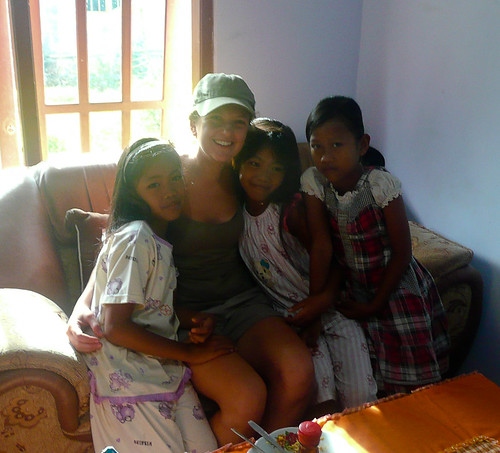 |
| Tommy and Siti's two girls and another one that appeared. |
The next morning we planned to leave early, as we had 50km to go to Pacitan, and it looked like it might just be possible, based on what little the contours on the map told us, and what Mahmoodi had said to us the day before. Tomy was convinced that it would only take us 3 hours, and that we should come to the beach in the morning with him, or even stay another night. We sat eating breakfast as we discussed this, with Tomy hovering around us with his camera phone taking photos of us eating.
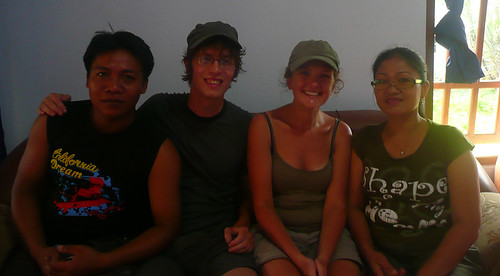 We are no nearer cracking what the Indonesian attitude to westerners is, as it seems at times to be pardoxical, and often strange. We touris are objects of fascination to many people once we get away from the major cities. Motorbikes overtake us with the back seat passenger staring open mouthed at us, we hear conversations abruptly stop as we ride through towns and turn to see people gazing at us, and we constantly hear phrases shouted in English as we ride along, which, if we reply to them, are generally met with raucous laughter. Alarm calls of “Touris! Touris!” sound out occasionally, with teenagers bolting out of their houses to see the spectacle. The best way we've found to deal with it is with a lot of smiling and waving, as it generally prompts a similar response, and being smiled and waved at is always good. It can get frustrating though when we're looking for directions and the first few people we come up to and ask just laugh at us like school girls, and we can't smile and wave to everybody we ride past, it soon gets tiring, so unfortunately the majority of the time we have to adopt the complete ignorance approach; pretending we didn't hear the half dozen shouts of “What is your name” as we ride through a town, and ignoring the cluster of people at the side of the road who have all turned and are staring at us as we approach them. It isn't ideal, but it is the only way we can remain sane.
We are no nearer cracking what the Indonesian attitude to westerners is, as it seems at times to be pardoxical, and often strange. We touris are objects of fascination to many people once we get away from the major cities. Motorbikes overtake us with the back seat passenger staring open mouthed at us, we hear conversations abruptly stop as we ride through towns and turn to see people gazing at us, and we constantly hear phrases shouted in English as we ride along, which, if we reply to them, are generally met with raucous laughter. Alarm calls of “Touris! Touris!” sound out occasionally, with teenagers bolting out of their houses to see the spectacle. The best way we've found to deal with it is with a lot of smiling and waving, as it generally prompts a similar response, and being smiled and waved at is always good. It can get frustrating though when we're looking for directions and the first few people we come up to and ask just laugh at us like school girls, and we can't smile and wave to everybody we ride past, it soon gets tiring, so unfortunately the majority of the time we have to adopt the complete ignorance approach; pretending we didn't hear the half dozen shouts of “What is your name” as we ride through a town, and ignoring the cluster of people at the side of the road who have all turned and are staring at us as we approach them. It isn't ideal, but it is the only way we can remain sane.So we were sat there eating noodles, while Tomy pointed his phone at us and clicked away, and asked us to stay with him for another day. We had to refuse, because being photographed all day wasn't high up on our to-do list, but also because we were falling behind with time. We had thought that the hills wouldn't be that bad down here, and had planned on the route taking us one day, not the three it had done so far. The morning was getting on, it was already almost 9 o'clock, so we took our leave and left, praying that Tomy's 3 hour estimate was on the mark, although being almost certain that it wouldn't be.
It took us right the way up to 6pm to get to Pacitan and find accommodation, but after two days of incessant up hills, the road that day was a real treat. It was hard work, and we were confronted by a sloping up hill road straight away, but it wound up gently, along the tops of ridges, through villages. The more relaxed angles meant that we could enjoy the whole day, rather than spend it fighting gravity. The strain of the previous two days did have its benefits though, as we both had endorphins pinging around in our heads before the day was out, as we made the final approach along a 500m high ridge top that looked down on the estuary where Pacitan lay.
The final 10km were some of the best riding we've had so far; in part because it was down hill all the way, in part because we knew we had a day off waiting for us at the bottom, and in part because we were buzzing with happy chemicals earned during the previous days; but also because the views were absolutely stunning, and it marked the end, for now at least, of some of the toughest riding we've done so far. The sun was setting on the valley below us, and we could see it reflected in the river as it fattened before emptying into the sea. We took a few snaps, then put on our helmets, gave the brakes an experimental squeeze, and rolled off down the road. The posts at the side of the road counted down the kilometres as we hurtled down: 8, 7, 6, 5. It was a joy given how 1km had taken us hours some of the time the days previous.
We arrived at the base of the river with sore hands from pumping the brakes, and with rims as hot as kettles, and pedalled over the bridge into town, and then down towards the beach where we found a nice collection of cheap bungalows, and enjoyed a mighty dinner of fresh fish and rice. Those three days had been really tough, but coming out the other side we were positively bouncing with energy – for about half an hour. Then sleep crept up on us, donked us on the head and laid us out in our beds, not rousing us until the next morning, when we had the whole day to ourselves.
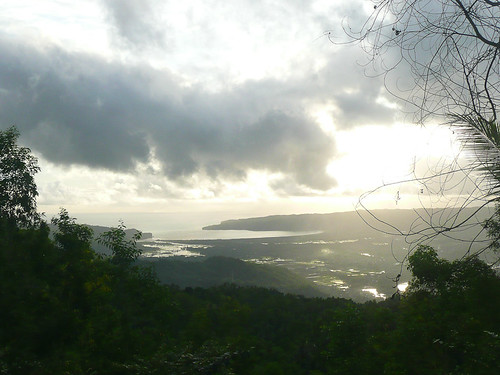 |
| View of Pacitan. |
Christmas Eve, 6.30am, Sati Hotel, Yogyakarta, Central Java.
Total distance: 1123.5km
Pacitan was a relaxed place. One of a series of beach resorts, it was used to westerners and we cruised around the town the next day without any strange looks from the locals. We spent a little time on the beach just outside our front door, and a lot of time eating at cafes and restaurants, which served some really good food, and helped us regain our energy levels ready for the final push towards Yogykarta, our destination for Christmas that lay some 130km away to the north west.
Although well set up for tourists, both western and Indonesian, by night Pacitan was eerily quiet. Both nights we ate at a good outdoor restaurant just next to our bungalows, and both nights it was almost completely deserted. They had a staff of at least a dozen, milling around doing nothing with a whole array of wooden tables and chairs laid out across the gardens before them. The whole beach front was quiet, and in actual fact we think there was probably only us and maybe one other family staying in the entire resort.
Liv really wanted to feel like we weren't the only people in the place, you know, sit in a busy restaurant, not one that's just survived an apocalypse. I quite enjoyed the peace and quiet of the place though, we took the pick of seating, and got to just sit there and relax--
“TESTING TESTING. SOUND CHECK. SOUND CHECK.”
To our astonishment and horror, a duo that had been milling about by the cashier had set up a keyboard and a mic, and were evidently about to start playing. We had sat ourselves right by an extremely loud speaker that drowned out our voices. So we upped and slunk away to a distant cluster of tables. Their only patrons, the musicians only audience, ran away. Tough crowd.
So both nights we ate in a deserted restaurant, while a duo performed Elton John's 'Can you feel the love tonight' badly, over and over and over. The female vocalist seemed to try and compensate for the difficulty she had with certain consonants by suddenly and sharply dipping her voice, but this hiccuping just made it sound like she was tripping over every few seconds, or swallowing a fish. The guy on the keyboard, who didn't have to do anything since the whole kareoke backing of the song was being played from CD, sat there trying to do fancy flourishes, dancing around the melodies of the song. But he couldn't, and every time he tried inevitably a note was out of key, and sounded more like a child rushing through their scales and messing them up; while a woman crooned bizarrely next to him. The song ended, there was a moment's pause, then the backing CD fired up again with that popular hit 'Can you feel the love tonight', by Elton John. This went on all night. It was excellent, demented entertainment.
We took our time getting up the next morning, and spent a while pedalling around the town looking for an ATM and suncream. We found neither, and finally set off towards Yogykarta at about 11am. It was steep and hot getting out of the basin that the estuary had formed, and it conjured up unhappy memories of the previous few days. We prayed that the rest of the way there wouldn't be hilly - we felt like we were due a nice run of flat.
Thankfully that's just what we got, pretty much. There were a few small hills, but really nothing like the road from Prigi. It was something of a novelty for us to be just cruising along flat paved roads, watching the speedo click round in ten metre intervals, and recalling how much effort and time that same distance had taken three days ago.
But if the previous few days had been marked by uphills, the two days cycling to Yogyakarta were to the tune of monsoon rain. It came just as we got up the first hill out of Pacitan, the clouds moving in as we began riding along the flat road, and then beginning to empty on us within minutes. We ducked into a warung and had a small lunch, hoping to wait out the worst of it, but it didn't shift. The whole sky was grey, and the rain came in buckets. After an hour we decided that we just had to go on – there was one large city on the way to Yogyakarta, about 70km away, which we wanted to get to before nightfall. So we put on our waterproofs, and began cycling.
It was almost exactly like cycling all day with a shower head above you, on full blast, spraying you with warm water. We got soaked, and learnt that “waterproof” is something that is open to interpretation when cycling in such conditions all day. Our clothes got damp before too long, and my handlebar bag's waterproof cover failed to prevent the inside getting wet. Our phrasebook took a bit of a drubbing. Liv found one of her panniers had gotten wet inside, but luckily the rest of them stayed true to their word, which really is impressive given what they went through.
The road we cycled along was beautiful. Gently rising, falling and curving through cultivated fields nestled among rock outcrops, before rolling down into the plains that lay ahead. You might say that the rain spoilt that somewhat, because everything just looked grey and wet, but it was certainly a unique experience riding through it that we shan't forget, and that kind of thing is important, I think. Hope so anyway, we seem to do a lot of it. By the end of the afternoon many of the roads were suffering minor flooding, with clay coloured rainwater washing across them, and pooling in ankle-deep puddles.
Liv copped a mouthful of this salubrious road water as a truck drove past us, and we decided it was high time to call it a day, despite the fact we hadn't made it to our intended destination. Luck was still on our side though, and it just so happened that we were in a town that did have a guest house. We tracked it down, tried to dry ourselves off, and then had to walk back out after dark to find a little warung for a supper of noodles. The next day we got up early, and cycled hard through early morning drizzle, into the late morning sun, and as the afternoon arrived shops and houses sprang up along the side of the increasingly busy road, and we realised we were on the run into Yogykarta. Here, we would spent Christmas, and a long run of well earned days off. We tracked down a touristy area with lots of hotels, bartered the hell out of one, and set out straight away to a cafe just outside where they served amazing, healthy food. No added sugar! We were in heaven!
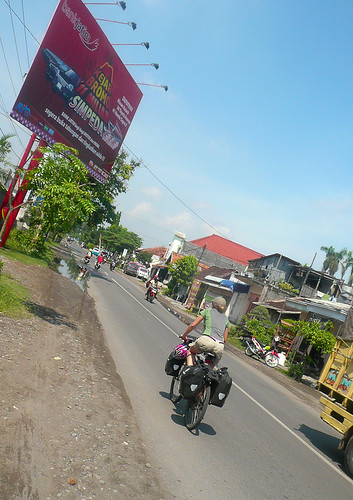
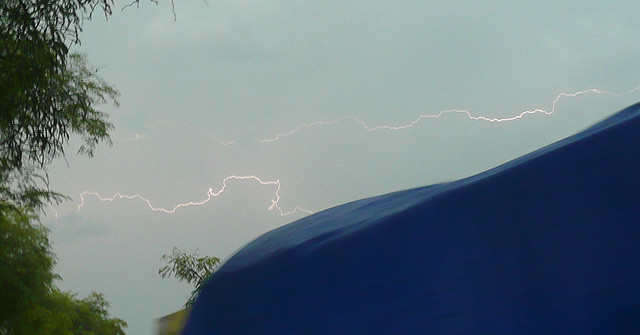

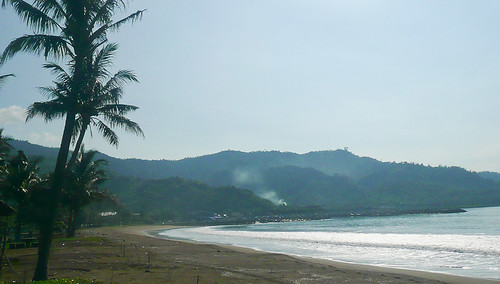
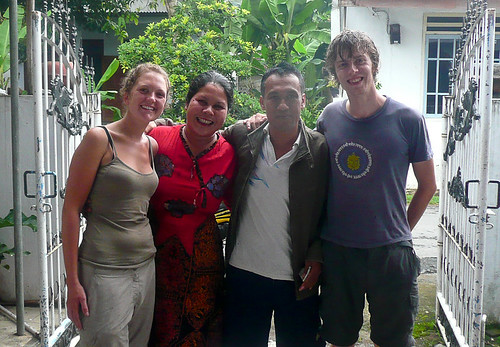



No comments:
Post a Comment